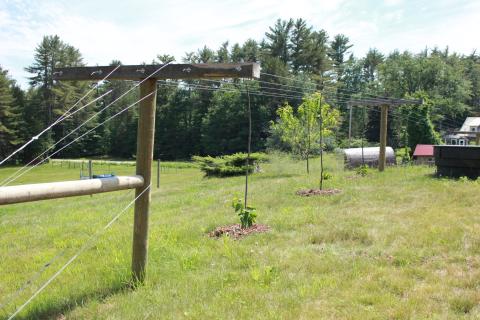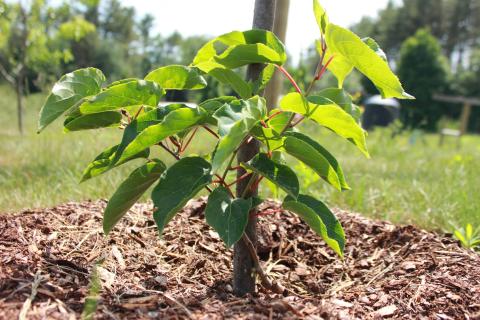UNH Researchers and New Hampshire Farmers Team Up for Unique Kiwiberry Breeding Program
In North Sutton, New Hampshire, John and Erin Maynard are growing kiwiberry plants as part of University of New Hampshire research on their personal farm.
Although their farm started with sheep and has primarily been protein-focused, they have begun to shift gears. John was interested in kiwiberries before he found out about the program, saying, “When we were living overseas, one thing we liked to do was buy unique foods from the store and, at some point, we ran into kiwiberries.” He and his family have always enjoyed trying new and unique foods and kiwiberries were the next natural step on his farm.
This unique breeding program in partnership with UNH is the only one in the nation and the first in the world to develop a genetic identification and selection procedure for this crop.
Through this program, the farmers and researchers have evaluated over 4,000 potential new varieties and advanced 29 elite selections to go to replicated trials.
The goal is to find commercially viable varieties of the kiwiberry that can be used for mass production. However, this process is long and tedious as neither the farmers nor the researchers know which variety will be most productive. The farmers are given a batch of kiwiberry plants and must sort through to differentiate between male (pollen-producing) and female plants (fruit-producing). Their goal is to find production female varieties, as those are the ones that produce the most fruit.

What is a Kiwiberry?
The kiwiberry is a woody perennial climbing vine that produces a cluster of small, grape-sized fruit that are like kiwi. There are lots of appealing and delicious aspects about this berry, including the fact that it is hairless. The outer skin is thin and palatable, meaning you can eat it directly and conveniently without having to peel. This was something that John found attractive as he enjoys having plants around his farm “that you can just go up to, pick and eat.”
There have been some barriers to growing this berry – because flowers are required for fruit production it can take many years before a vine can be of fruit quality. Additionally, years can be spent evaluating vines only to find, once they flower, that half of them are male and thus of no interest to the program.
The program aims to maximize efficiency and has done so by effectively reducing the average flowering time from five to six years, to just three years.

Want to learn more about kiwiberries and this unique farming partnership with UNH? As of August 2024, check out the UNH Extension podcast episode of Shared Soil that features Kendall Kunelius and Rebecca Dube talking in depth with John and Erin about their farm!
